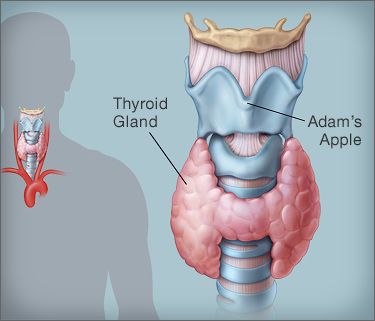
The thyroid controls how your body’s cells use energy from food, a process called metabolism. Among other things, your metabolism affects your body’s temperature, your heartbeat, and how well you burn calories. If you don’t have enough thyroid hormone, your body processes slow down. That means your body makes less energy, and your metabolism becomes sluggish.
What Causes Hypothyroidism?
The most common cause of hypothyroidism is Hashimoto’s thyroiditis. “Thyroiditis” is an inflammation of the thyroid gland. Hashimoto’s thyroiditis is an autoimmune disorder. With Hashimoto’s, your body produces antibodies that attack and destroy the thyroid gland. Thyroiditis may also be caused by a viral infection.
Other causes of hypothyroidism include:
Radiation therapy to the neck area. Treating certain cancers, such as lymphoma, requires radiation to the neck. Radiation damages the cells in the thyroid. This makes it more difficult for the gland to produce hormone.
Radioactive iodine treatment. This treatment is commonly prescribed to people who have an overactive thyroid gland, a condition known as hyperthyroidism. However, radiation destroys the cells in the thyroid gland. This usually leads to hypothyroidism.
Use of certain medications. Certain medicines to treat heart problems, psychiatric conditions, and cancer can sometimes affect the production of thyroid hormone. These include amiodarone (Cordarone), lithium, interferon alpha, and interleukin-2.
Thyroid surgery . Surgery to remove the thyroid will lead to hypothyroidism. If only part of the thyroid is removed, the remaining gland may still be able to produce enough hormone for the body’s needs.
Too little iodine in the diet. The thyroid needs iodine to produce thyroid hormone. Your body doesn’t make iodine, so you need to get it through your diet. Iodized table salt is rich in iodine. Other food sources of iodine include shellfish, saltwater fish, eggs, dairy products, and seaweed.
Symptoms of Hypothyroidism
Symptoms of hypothyroidism may be vague and can often mimic other conditions. They may include:
- Changes in the menstrual cycle
- Constipation
- Depression
- Dry hair and hair loss
- Dry skin
- Fatigue
- Greater sensitivity to cold
- Slow heart rate
- Swelling of the thyroid gland (goiter)
- Unexplained weight gain or difficulty losing weight
- Carpal tunnel syndrome
Babies with hypothyroidism may have no symptoms. If symptoms do occur, they can include:
- Cold hands and feet
- Constipation
- Extreme sleepiness
- Hoarse cry
- Little or no growth
- Low muscle tone (floppy infant)
- Persistent jaundice (yellowing of the skin and whites of the eyes)
- Poor feeding habits
- Puffy face
- Stomach bloating
- Swollen tongue
Make an appointment with your health care provider if you or your baby has any of these symptoms. It is important to note that these symptoms can be due to other medical conditions.
How Is Hypothyroidism Treated?
If you have hypothyroidism, your doctor will prescribe a synthetic (man-made) thyroid hormone T4. You take this pill every day. Certain other medications can interfere with how your body absorbs synthetic thyroid hormone. Make sure you doctor knows about all the medicines, herbs, and supplements you take, including over-the-counter products.
You will need regular blood tests to check your thyroid hormone levels. Your doctor may need to adjust your medication dose from time to time.
Complications of Hypothyroidism
Untreated, hypothyroidism may cause:
- Heart problems
- Infertility
- Joint pain
- Obesity
Thyroid problems in a pregnant woman can affect the developing baby. During the first three months of pregnancy, the baby receives all thyroid hormone from its mother. If the mother has hypothyroidism, the baby does not get enough thyroid hormone. This can lead to problems with mental development.
Extremely low levels of thyroid hormone can cause a life-threatening condition called myxedema. Myxedema is the most severe form of hypothyroidism. A person with myxedema can lose consciousness or go into a coma. The condition can also cause the body temperature to drop very low, which can cause death.

Post a comment